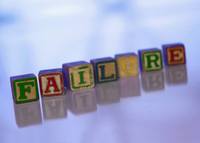 Why are we so afraid of failure? Does it make us look bad? Will dire consequences happen if we fail? Do we really believe that “failure is not an option” – like the famous movie line from Apollo 13?
Why are we so afraid of failure? Does it make us look bad? Will dire consequences happen if we fail? Do we really believe that “failure is not an option” – like the famous movie line from Apollo 13?
In fact, failure was necessary in order for NASA to ultimately find a solution. They failed many, many times before they discovered a way to get the spacecraft home safely. Thomas Edison failed multiple times before creating every single one of his inventions.
Following on from last week’s blog about innovation, no true innovation happens without multiple failures along the way to the ultimate solution. Everyone learns from failure. Why didn’t it work? What could we do differently? What have we not thought of yet?
Rather than holding on to a fear of failing, what if we embraced it? I believe lack of failure leads to mediocre and stale performance and results. If failure is “not allowed”, no one will question the status quo, no one will take a risk and you will be doomed to do things as they always have been done. On the other hand, if failure is allowed, and no one is made to feel wrong for trying different approaches or ideas, what might be accomplished? It was Einstein who said that doing things the same way over and over expecting a different outcome was a definition for insanity.
In Dave Logan’s work, “Tribal Leadership,” a tribe with people at stages one and two are stuck in “life sucks” and “my life sucks” attitudes. I guarantee these folks at these stages are not going to innovate anything good that will help your company grow. What if you asked them to try something different, without dire consequences? What if they were allowed to improve just one thing to make their work life a little better? It could make a difference for them and it will likely make a difference for the company’s bottom line – happier people are more productive. Now granted, you’re not just going to tell everyone they can try anything they want because chaos would result, but if managers and supervisors allowed a little more flexibility, and independence including failure to take place, what solutions might surface?
With today’s helicopter parents, everybody gets a trophy. Children are being raised to think everything they do is special and kids are getting a warped sense of how to deal with failure, let alone experience it. If they never fail, how do they develop coping skills? If Mom and Dad run to the teacher to fix every grade and make excuses for poor performance, how is a child going to know how to make it better on their own? How do kids learn to ride a bike? First with training wheels, then with a parent’s hand on the back of the seat, then by falling a few times before they make that first “real ride”. When parents understand this, they expect the falls and are supportive in the process. What if leaders were the same way with their organizations? Not that they should become “parental” toward their teams, but what if they understood and accepted there needs to be a few falls before a successful ride?
Failure is a part of the road to success, without it, mediocrity reigns and innovation dies.
